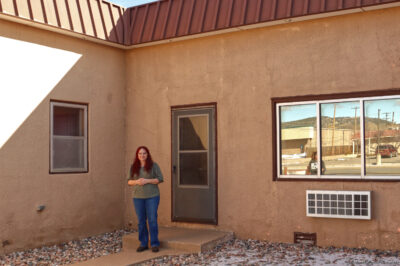by Liz Ampairee (The Mongol Derby 2016) ~
THREE riders cross the line together to win the 2016 Mongol Derby!
At 9:51am local time, Marcia Hefker-Miles from Raton, New Mexico, Will Comiskey from Australia and Heidi Telstad from British Columbia crossed the finish line, arms together, to take a triple dead heat in the 2016 Mongol Derby, at 1000 KM, the world’s longest and toughest horse race.
They gave thanks to the horses, herders and people of Mongolia for an incredible experience and said they wanted to share the experience of winning as a team just as they had shared the experience of the trail.
Will Comiskey, 28, ‘Dingo’, a cattle rancher from Longreach , said, “There were slow ones, there were wild ones, but ****, we had fun!!”
Marcia Hefker-Miles, 45, from New Mexico, said her most memorable memory was “Riding through a high mountain pass, past a boy and a girl both herding goats; making eye contact with them and waving. I saw myself in that little girl…”
Heidi Telstad, 43, a lawyer from British Columbia, said hers was “Camping one night with a poor family; they gave everything they had to spare to me and my horse and treated me as one of their own.”
Next to finish in the Mongol Derby were Tatiana Mountbatten and Venetia Philipps, from the UK and Courtney Kizer from Texas.
The following information was taken from the Santa Fe New Mexican article published Wednesday, July 27 and updated August 5th, 2016.
(Associated Press) RATON, N.M. — After her first 26-mile endurance horseback ride, Marcia Hefker was so tired she fell asleep by the campfire. “Someone had to wake me up because the bottom of my tennis shoes were smoking,” she said on a recent early morning ride across a friend’s ranch.
Now, 15 years later, riding 100 miles in a day isn’t unusual for her.
She has completed and won dozens of endurance rides around the U.S. and in France. She and her horse Jackson recently rode the Tevis Cup, a brutal 100-miler from Truckee, Nevada, across the Sierra Nevada Mountains to Auburn, California. This was her fourth time tackling the Tevis, where only about half the riders finish each year. She placed sixth in the event in 2011.
Not long before the race, she was reminded of how dangerous the Tevis Cup remains.
 “I usually laugh about it, but I’ve been pretty somber about my decision to do this race again, since one horse perished on the Tevis trail two days ago when he slipped off the edge and fell 100 feet to the river,” Hefker said in an email earlier in July. “His rider jumped to safety during the fall and is OK, relatively.”
“I usually laugh about it, but I’ve been pretty somber about my decision to do this race again, since one horse perished on the Tevis trail two days ago when he slipped off the edge and fell 100 feet to the river,” Hefker said in an email earlier in July. “His rider jumped to safety during the fall and is OK, relatively.”
On Aug. 4, Hefker, 45, a New Mexico native, will step out among a herd of tough little Mongolian horses, saddle the one she’s selected and set out on a 621-mile odyssey across some of the most rugged, isolated terrain on the planet as part of the Mongol Derby.
The event recreates the postal relay route developed in 1224 by the Mongolian leader Genghis (Chinggis) Khan.
This year, 23 women and 21 men representing 13 countries will participate in the derby, acting as “messengers” along the route. Launched in 2009, the race earned the title of world’s longest multi-horse race in 2010 from the Guinness World Records.
Hefker, raised on her family’s cattle ranch in Carrizozo, grew up in a saddle. She traded barrel racing for long-distance horse races after she became a nurse practitioner.
“I realize now that I have an advantage over people who just started riding in adulthood,” she said. “I’m used to being tossed around in the saddle in different scenarios, thanks to roping and barrel racing and working cattle. I feel more secure in my seat. I hope that will help me in Mongolia.”
Her family is accustomed to her horse madness. Both of her sons grew up riding with her. Now she is teaching Mark Miles, her husband of 18 months, to handle a horse.
She has five horses to keep in shape. A couple of them are endurance horses. Three others are for elk hunting, backcountry camping and just for fun.
Last year, Hefker and her endurance horses covered more than 900 miles in races alone.
Eddy is one of them. On the morning ride, he stretched his slender, gray legs as he walked in the ground-covering stride endurance horses are known for. “We’ll do 100 miles, and the next day he’s ready to do it again,” Hefker said. “He loves it.”
But if a horse doesn’t like riding long distances, that’s OK with Hefker. “If they’re not, let’s find them a different job,” she said. “I’m in this for fun myself. I don’t want to keep pushing an animal.”
Training for an endurance ride takes patience. It can take two years to condition a horse properly for a first endurance race.
“People will think 50 miles, 100 miles is too far for a horse,” Hefker said. “But it’s just like marathon running for humans. You build your horse up. I’ve seen people take more care of their horses at endurance rides than any other equestrian event because you need your partner all day.”
Endurance horseback riders are, by nature, “a little crazy,” she added. “You almost have to be.”
They like to be on horseback all day long.
Endurance rides are less formal than a lot of equestrian events. “There aren’t rules on what you wear, what kind of tack you use, what kind of horse you’re riding. So you can just be you,” Hefker said. “It’s a sport where you can be very individualized but come together for the common goal of enjoying the day with your horse.”
On the Mongol Derby, Hefker will be allowed to carry only 11 pounds of gear, including her sleeping gear and medical supplies. Riders stop about every 40 miles at horse stations to refuel, rest and pick a fresh horse. They can only ride from 7 a.m. to 8:30 p.m. each day.
Veterinarians also check the horses at each station. If a horse isn’t healthy, extra hours are added to the racer’s time. If a racer asks for medical help, more hours are added.
Racers can eat traditional Mongolian food at the horse stations, but Hefker said she plans to limit her consumption of native food because her stomach won’t be used to it.
The Mongol Derby is one of eight unusual races designed by an organization called The Adventurists, which aims to raise money for charities while “fighting to make the world less boring.” So far, nearly 2,000 people from 37 countries have participated in long-distance races using rickshaws, cars, mopeds and horses, raising more than $5 million for various charities, according to the group.
The Mongol Derby was the brainchild of Adventurists staffer Baigal Gongor, whose father once worked at the horse stations used on the ancient postal route until 1949, said Katy Willings, the derby’s organizer. Older Mongolian herders still remember the horse stations.
“We had this unbroken line from those herders stretching back to Genghis Khan,” Willings said. “There was a memory of how to manage the horse stations.”
Each year, the organization hires different Mongolian herdsmen and their families, who own the tough, steppe-bred horses, to help with the race. The derby has helped the herder economy and revived interest in its traditional horse culture, Willings said. “The derby is such an overt tribute to Mongolian history and culture.”
Mongol Derby organizers have few rules for the riders, Willings said. “You are on your own. No outside assistance. You must navigate independently, choose the right horses, manage yourself and your horses.”
But derby riders must be adept in equestrian or survival skills — or both. One of this year’s riders is Adam Casey, 29, a U.S. Marine who survived Stage 4 cancer. He had never ridden a horse until he began training for the derby this year, but he knows a lot about survival.
“So much of the challenge in the derby is mental, more than physical,” Willings said. “You can be a beautiful rider, perfectly balanced, and still only make it one-fourth of the way around the derby.”
Planning, plus flexibility, are key to finishing.
Endurance horseback riding, like ultramarathons, is a place where women can compete on par with men.
The winner of the 2015 Mongol Derby was a South African woman, Byeronie Epstein. She was only 30 seconds ahead of the second-place finisher, also a woman, Elise Poitrinal.
Hefker hopes she’ll be the woman winning this year, but she’ll also be happy just to finish in one piece.
Whatever happens on the Mongol Derby, Hefker said, she will enjoy the adventure.





